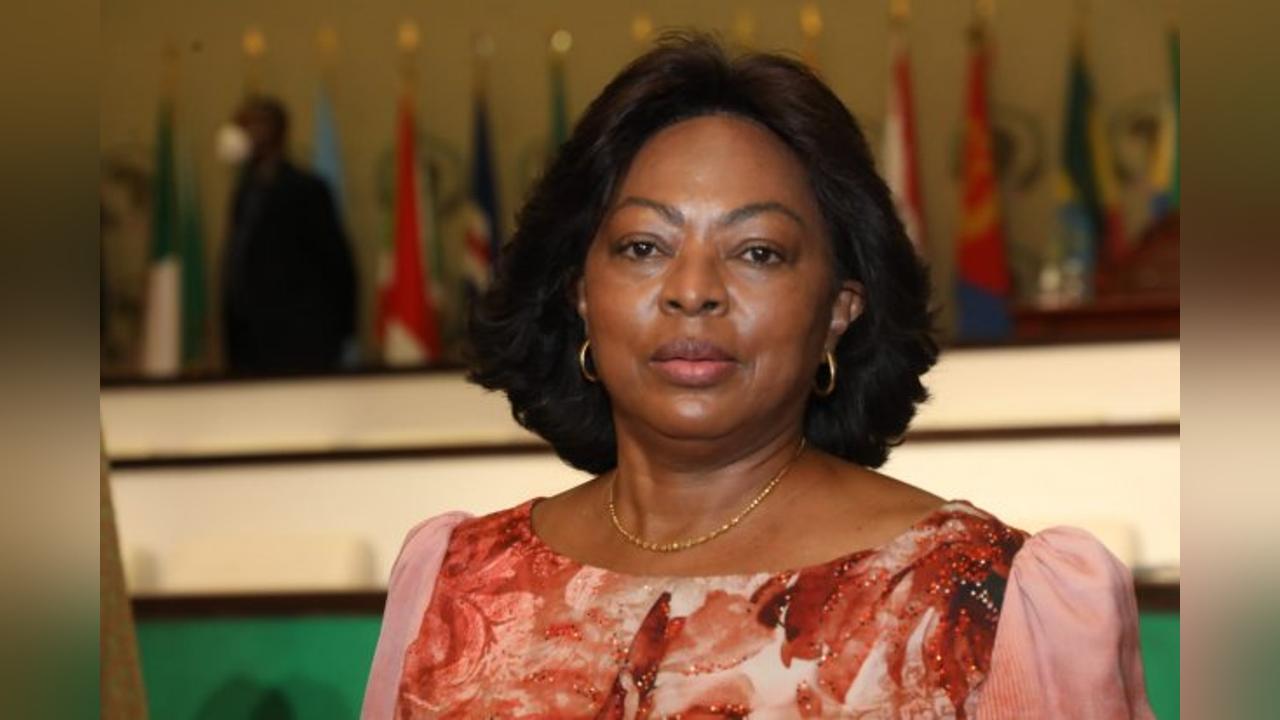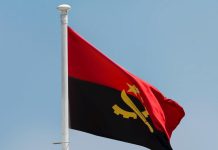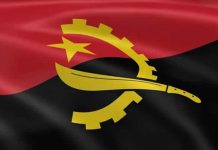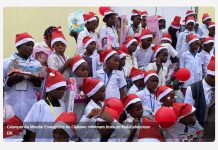Africa-Press – Angola. The First Lady of Angola, Ana Dias Lourenço, defended, this Monday, in Abuja (Nigeria), redoubled efforts to teach literacy and catch up on academic delays among African girls, with special attention to those in rural areas.
Ana Dias Lourenço was speaking on the occasion of the launch of the WeAreEqual/We are all equal Unifying Campaign, promoted by her counterpart from Nigeria, Oluremi Tinubu, within the framework of the activities of the Organization of African First Ladies for Development (OPDAD).
“We must reinforce our advocacy role to teach girls literacy and catch up on school delays, with special attention to those in rural areas”, he stated.
For the Angolan First Lady, it is urgent to promote trust, security and stability through the creation of safe, protected and stable environments.
At the same time, he continued, it is imperative to raise youth awareness about significant progress in the development and growth of “the Africa we want”.
Addressing her African counterparts, Ana Dias Lourenço recalled that, in this regard, Angola has been implementing, since 2021, the Girls’ Empowerment and Learning for All Project, across the entire country.
He explained that the project, which involves around nine million students from Pre-School, Primary and Secondary Education schools, aims to train teachers and school managers, as well as support strategies to promote girls’ empowerment through improving the system educational.
The Abuja ceremony took place under the motto “Education as a powerful tool for change: no girl is left behind”.
The First Ladies of Mozambique, Zimbabwe, Gambia, Lesotho, Kenya, Burundi and Gabon were also present, as well as senior officials from the Nigerian Government and other guests.
Here is the full message from the Angolan First Lady:
Your Excellency First Lady of the Federal Republic of Nigeria Mrs. Senator Oluremi Tinubu,
Excellencies First Ladies
Zimbabwe – Mrs. Auxilia C. Mnangagwa
Mozambique – Mrs. Isaura Ferraro Nyusi
Gambia – Mrs. Fatoumata Bah – Barrow
Lesotho – Queen Masenate Mohato Seeiso
Kenya – Mrs Rachel Ruto
Burundi – Mrs.Angeline Ndayubaha
Gabon – Mme Zita Oligui Nguema
Distinguished Officials of the Federal Government of Nigeria
Dear Guests
My Ladies My Gentlemen
I begin by thanking you for the invitation addressed to me to participate in the celebration of the Launch of the # WeAreEqual Unification Campaign of the Organization of African First Ladies for Development (OAFLAD).
Allow me to greet the dear sisters, Your Excellencies First Ladies and the distinguished delegations, and the guests present at this magnificent event taking place in this welcoming city of Abuja.
I especially address words of appreciation and recognition to my dear sister Senator Oluremi Tinubu, First Lady of Nigeria, for promoting the inclusion of girls in education, ensuring the achievement of Goal 4 of the SDGs, related to inclusive and equitable education and promoting opportunities for lifelong learning for all.
Angola has been rising from the heavy burden of war that postponed its people’s opportunities for human and social development for many years. With the achievement of Peace in 2002, the Government has made several efforts to implement public policies and carry out actions, programs and projects that enhance the country’s inclusive and sustainable development.
From this perspective, it seriously invested in reducing disparities between men and women imposed by structural sexism, social stereotypes and patriarchal structures rooted in cultural and traditional issues.
We are aware that we still face many obstacles that make it difficult and prevent women in Angola and throughout Africa from developing their full potential, such as – the lack of human and material resources in some communities, the different forms of violence and abuse against women and limited access to education, particularly girls’ education.
Dear Firsts – Ladies, dear sisters
My Ladies My Gentlemen
The challenges are still immense, despite the evolution of African societies towards greater justice, inclusion and awareness of the need for greater female representation in all areas of social, economic and political life.
However, greater investment in people, through quality education, with increased access to pre-school and secondary education especially for girls, is essential so that, with determination and vision, we can effectively, men and women, contribute to the sustainability of our development with an innovative outlook and an unwavering commitment to the well-being of communities. Given this reality, education is vital for the future of any country.
In Angola, we treat education as a crucial sector for valuing human capital. We take particular care with the education of girls, as educating a woman is educating a Nation.
In this context, my dear sisters, I think we must reinforce our advocacy role to teach girls literacy and catch up on school delays, with special attention to those in rural areas.
We urgently need to promote trust, security and stability by creating safe, secure and stable environments and sensitize the youth to the significant progress in the development and growth of Africa we want.
Dear Guests
My Ladies and Gentlemen
In Angola, at different levels of education, there are still differences between men and women, the Government has seriously invested in reducing this difference. I remember that, in my capacity as Minister of Planning and later as a member of the Board of Directors of the World Bank Group, we began the approach with this institution in order to support Angola to overcome the challenges we faced, related to low learning results and gender disparity, especially in secondary education, with girls dropping out of school for various reasons such as early pregnancy, difficulties in health care, the distance from home to school or socially unfavorable family contexts.
And this is how the Girls’ Empowerment and Learning for All Project was designed and has been implemented since 2021. It is a project that involves around 9 million students from Pre-School, Primary and Secondary Education schools across the country.
The Project aims to train teachers and school managers, support strategies to promote girls’ empowerment through improving the education system and access to education, empowering girls and young women, giving them the opportunity to enroll and complete at least the high school.
The main activities of the project aim to improve the quality of teaching, promote access to education, reduce the school dropout rate among girls and facilitate the return of teenage mothers to school, raise awareness about sexual and reproductive education and gender-based violence with an ultimate aim of empowering young people, reducing the vulnerability of adolescents and young people, empowering young people and equipping them with skills and abilities for life. Actions complementary to this project to guarantee Health, Education and the Well-Being of adolescents and young people, have been developed by the authorities of my country, in particular by the Ministry of Education with the support of the Ministry of Health, with a view to responding to the problem of children with an age-class gap, to reduce school dropout rates, particularly among girls who leave school before completing compulsory education, due to early pregnancy: the main cause of a high number of school dropouts.
On the other hand, policy measures were adopted such as: the system for granting Internal Scholarships, which covers vulnerable girls from various regions of the country, to guarantee access to school; retention with school meals; health and school environment; sexual, gender and reproductive health education; promotion of sport and other activities to ensure the inclusion of girls in school.
Allow me to share some numbers and facts that illustrate the Government of Angola’s commitment to inclusive and equitable education and the promotion of lifelong learning opportunities for all:
– In 3 years it was possible to correct the gap of 3,216,489 students, of which 2,536,412 are female;
– Since 2021, 10,357 primary and secondary school teachers have been trained in menstrual health, and more than 30,000 teenagers have benefited from information on the subject, with 15,000 menstrual underwear having been distributed; –
In the last 4 years, 21,244 scholarships for secondary education were distributed, of which 10,729 were for girls;
– In recent years, 1,098 primary and secondary schools have been built and rehabilitated. With the girls’ empowerment and learning for all project, the construction of 55 new schools and the rehabilitation of 7 schools are expected to begin in 2024.
– The investment in teacher training in the areas of education and menstrual health, presented positive results and earned Angola distinction at the gala in reference to the 10th anniversary of the program to safeguard adolescents and young people of the United Nations Population Fund (UNFPA), having been ranked 1st in the menstrual health category of the 5th and 6th classes, at the southern region level.
Dear Sisters
Dear Participants
As a citizen, I have always fought for the freedom and dignity of people and for gender equality, now as First Lady and with my Ngana Zenza Foundation for Community Development (FDC), I remain committed to these causes and committed to improving the quality and expansion of education, in the empowerment of our girls and boys in the communities, through 7 initiatives aimed at women, young people, in particular young women from various segments of our society as agents of change and influence in their respective communities.
To conclude, I once again salute the “We are all equal” Campaign, as gender issues and their parity in leadership continue to be a subject of our action. Angola embraces the Campaign and will soon launch it. I wish my dear sisters, the First Ladies and everyone present, good health, peace and love and I hope we can be together again as soon as possible. Together we will continue to advocate for the promotion of educational programs in Africa in “the year 2024, seeking to revive existing efforts to fully achieve Goal 4 of the SDGs”.
Well Haja
Thank you for your attention!
ANGOP
For More News And Analysis About Angola Follow Africa-Press






